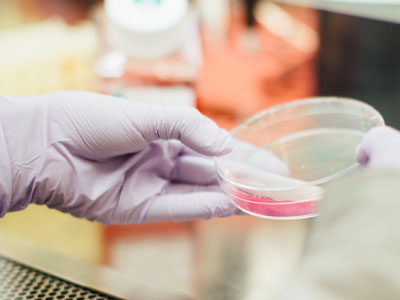Ph.D. Descriptions
Fifty-seven (57) semester hours are required for the Ph.D. degree in ChE as follows:
- Fifteen (15) semester hours of ChE core graduate courses
- Fifteen (15) semester hours of approved graduate electives
- Twenty-seven (27) semester hours of ECH 6980, Dissertation
- Successful completion of ECH 8965, Doctoral Preliminary Exam (0) (P/F grade only)
- Successful defense of an oral and written dissertation - ECH 8985, Dissertation Defense (0) (P/F grade only)
- Registration and attendance at all departmental seminars - ECH 5935, Chemical Engineering Seminar (0)
Required Chemical Engineering Core Graduate Courses (fifteen [15] semester hours):
- ECH 5052 - Research Methods in Chemical Engineering (3)
- ECH 5126 - Advanced Chemical Engineering Thermodynamics I (3)
- ECH 5261 - Advanced Transport Phenomena I (3)
- ECH 5840 - Advanced Chemical Engineering Mathematics I (3)
- ECH 5852 - Advanced Chemical Engineering Computations (3)
Chemical Engineering Graduate Electives (fifteen [15] semester hours):
Minimum 6 semester hours are required to be in the chemical engineering major elective courses list. Students should consult with their faculty advisor to determine the elective courses offered by the department. Typical chemical engineering major elective courses:
- ECH 5262 - Advanced Transport Phenomena II (3)
- ECH 5526 - Advanced Reactor Design (3)
- ECH 5706 - Electrochemical Engineering Science (3)
- ECH 5806 - Petroleum Science and Technology (3)
- ECH 5820 - Polymer Physical Science and Engineering (3)
- ECH 5828 - Introduction to Polymer Science and Engineering (3)
- ECH 5834 - Chemical Engineering Materials (3)
- ECH 5838 - X-Ray Structural Characterization of Materials (3)
- ECH 5841 - Advanced Chemical Engineering Mathematics II (3)
- ECH 5934r - Special Topics in Chemical Engineering (3)
Find other elective courses in the CBE Approved Graduate Elective List.
Dissertation Hours (twenty-seven [27] semester hours):
- ECH 6980 - Dissertation (1-24) (S/U grade only)
Dissertation Defense (Zero [0] semester hours):
- ECH 8985 - Dissertation Defense (0) (P/F grade only)
Degree Requirements
Fifty-seven semester hours and the following requirements must be completed successfully for the award of the Ph.D. degree in Chemical Engineering:
- Passing ECH 8965 Doctoral Preliminary Examination within two consecutive exam attempts (see Ph.D. preliminary examination requirements below for more details). Successful completion will result in an initial admission to Ph.D. candidacy.
- Successfully complete Responsible Conduct of Research (RCR) training as part of the degree requirements by the end of the first fall term.
- Completion of 30 semester hours of advanced coursework (including 15 semester hours of core graduate coursework and 15 hours of electives).
- Completion of at least 27 semester hours of dissertation research, listed under repeatable course ECH 6980 Dissertation.
- Registration and attendance at all departmental seminars listed under repeatable course ECH 5935 Chemical Engineering Seminar.
- Select a research topic and faculty advisor(s) by the end of fall semester of first year.
- Form the full Ph.D. supervisory committee in consultation with the faculty advisor(s) before the Preliminary Exam starts.
- Submit and defend a prospectus on the dissertation topic to the supervisory committee no later than the end of the spring term of the second year.
- Complete a one-term teaching assistantship (lab TA) in an approved undergraduate laboratory between 2nd year and the term prior to the graduating term.
- Presentation of a research topic at one local, regional, national, or international professional meeting.
- Submission or publication of scholarly articles (minimum of one) based on original dissertation research in peer-reviewed journals.
- Satisfaction of the University Scholarly Engagement requirement.
- Successful passage of ECH 8985 Dissertation Defense. At least two hours of dissertation (ECH 6980) must be registered for concurrently during the term of the dissertation defense (ECH 8985).
No course with a grade below “C” will be counted toward the fulfillment of degree requirements. No more than one course with a grade in the “C” range will be counted toward the fulfillment of degree requirements.
All paperwork associated with the above requirements (see forms) must be submitted in a timely fashion to the Departmental office with appropriate signatures for review by the Graduate Committee and its Chair.
All ChE graduate students are required to attend the Program for Instructional Excellence (PIE) Workshop to prepare for teaching assistant (TA) duties. This requirement is mandatory regardless of the student's classification as a teaching assistant or research assistant. In addition, all students are required to take safety training courses as necessary.
Students with a master’s degree in ChE from the FAMU-FSU College of Engineering may, with approval of the graduate committee and major professor, take six (6) additional approved semester hours beyond the thesis-type master's course requirements to satisfy the thirty (30) semester hours required for the Ph.D. All other requirements must be fulfilled as stated above.
Fifty-seven (57) semester hours are required for the Ph.D. degree in BME as follows:
- Fifteen (15) semester hours of BME core graduate courses
- Fifteen (15) semester hours of approved graduate electives
- Twenty-seven (27) semester hours of BME 6980, Dissertation
- Successful completion of BME 8965, Doctoral Preliminary Exam (0) (P/F grade only)
- Successful defense of an oral and written dissertation - BME 8985, Dissertation Defense (0) (P/F grade only)
- Registration and attendance at all departmental seminars - BME 5935, Chemical Engineering Seminar (0)
Required Biomedical Engineering Core Graduate Courses (fifteen [15] semester hours):
- ECH 5052 - Research Methods in Chemical Engineering (3)
- ECH 5261 - Advanced Transport Phenomena I (3)
- ECH 5840 - Advanced Chemical Engineering Mathematics I (3)
- ECH 5852 Advanced Chemical Engineering Computations (3)
- XXX XXXX - Approved course in physiology or cell biology (3)
An approved course in Physiology or Cell Biology is required for completion of the graduate BME degree. Approved courses include:
- PCB 5137 - Advanced Cell Biology
- PCB 5204C - Cell Physiology (FAMU)
- PCB 5525 - Molecular Biology
- PCB 5595 - Advanced Molecular Biology
- PCB 5795 - Sensory Physiology
- PCB 5845 - Cell and Molecular Neuroscience
- BCH 5405 - Molecular Biology
- BME 5XXX - Fundamentals of Cell Bioeng
Additional courses may satisfy the physiology/biology requirement but require a petition to the Graduate Committee for approval as a core substitute.
Biomedical Engineering Graduate Electives (fifteen [15] semester hours):
Minimum 6 semester hours are required to be in the biomedical engineering major elective courses list. Students should consult with their faculty advisor to determine the elective courses offered by the department. Typical biomedical engineering elective courses:
- BME 5XXX - Advanced Biomaterials (3)
- BME 5314 - Bioengineering (3)
- BME 5362 - Neural Engineering (3)
- BME 5937r - Special Topics in Biomedical Engineering (3)
- BME 6530 - NMR and MRI Methods in Biology and Medicine (3)
Find other elective courses in the CBE Approved Graduate Elective List.
Dissertation Hours (twenty-seven [27] semester hours):
- BME 6980 - Dissertation (1- 9) (S/U grade only)
Dissertation Defense (Zero [0] semester hours):
- BME 8985 - Dissertation Defense (0) (P/F grade only)
In addition to the 30 credit hours of coursework and 27 dissertation hours, an oral examination in defense of the dissertation (BME 8985) is required for the biomedical engineering PhD students. At least two hours of dissertation research (BME 5980) must be completed during the term of the dissertation defense.
Degree Requirements
Fifty-seven semester hours and the following requirements must be completed successfully for the award of the Ph.D. degree in Biomedical Engineering, as follows:
- Passing BME 8965 Doctoral Preliminary Examination within two consecutive exam attempts (see Ph.D. preliminary examination requirements below for more details). Successful completion will result in an initial admission to Ph.D. candidacy.
- Successfully complete Responsible Conduct of Research (RCR) training as part of the degree requirements by the end of the first fall term.
- Completion of a minimum of thirty semester hours of advanced coursework (including fifteen semester hours of core coursework and fifteen semester hours of electives).
- Completion of at least twenty-seven semester hours of dissertation research listed as repeatable course BME 6980 Dissertation.
- Registration and attendance at all departmental seminars listed as repeatable course BME 5935 Biomedical Engineering Seminar.
- Select a research topic and faculty advisor(s) by the end of fall semester of first year.
- Form the full Ph.D. supervisory committee in consultation with the faculty advisor(s) before the Preliminary Exam starts.
- Submit and defend a prospectus on the dissertation topic to the supervisory committee no later than the end of the spring term of the second year.
- Complete a one-term teaching assistantship (lab TA) in an approved undergraduate laboratory between 2nd year and the term prior to the graduating term.
- Presentation of a research topic at one local, regional, national, or international professional meeting.
- Submission or publication of scholarly articles (minimum of one) based on original dissertation research in peer-reviewed journals.
- Passing BME 8985 Dissertation Defense. At least two hours of dissertation (BME 6980) must be registered concurrently during the term of the dissertation defense (BME 8985).
No course with a grade below “C” will be counted toward the fulfillment of degree requirements. No more than one course with a grade in the “C” range will be counted toward the fulfillment of degree requirements.
All paperwork associated with the above requirements (see forms) must be submitted in a timely fashion to the Departmental office with appropriate signatures for review by the Graduate Committee and its Chair.
All BME graduate students are required to attend the Program for Instructional Excellence (PIE) Workshop to prepare for teaching assistant (TA) duties. This requirement is mandatory regardless of the student's classification as a teaching assistant or research assistant. In addition, all students are required to take safety training courses as necessary.
Students with a master’s degree in BME from the FAMU-FSU College of Engineering may, with approval of the graduate committee and major professor, take six (6) additional approved semester hours beyond the thesis-type master's course requirements to satisfy the thirty (30) semester hours requirement for the PhD. All other requirements must be fulfilled as stated above.
Purpose and Format - Successful Ph.D. candidates will have a sound background in engineering, as well as the creativity and judgment necessary to conduct independent research. The purpose of the Preliminary Examination is to assess these qualities with an emphasis on evaluating the student's potential to conduct an original course of study and investigation. The Preliminary Examination tests the student's ability (1) to define, describe and examine critically relevant literature; (2) to think creatively and to apply basic chemical/biomedical engineering concepts; (3) to communicate in a scholarly and rigorous manner the progress and results of research; and (4) to conduct productive, rigorous and creative scientific investigations.
This exam will be based on the student’s ability to evaluate a fundamental research article from the literature on chemical engineering. Specifically, the student will be asked to:
- Identify the problems addressed in the paper;
- Formulate a critical appraisal of the authors' contributions to the problem and the significance of the work;
- Critically evaluate the technical soundness of the approach used and results obtained;
- Summarize and critique advances in the field since the publication of the assigned article;
- Propose in concrete terms research work that might be done to extend and (if necessary) improve upon the study discussed in the article; and
- Comment on the incorporation of the article's findings into the potential course of dissertation work of the student.
The Graduate Preliminary Examination Committee, which will be comprised of at least three faculty members, will assign a fundamental article from the literature on chemical or biomedical engineering. Three weeks following the assignment of the chosen research article, the student will be required to submit a written report on the exam problem as well as any additional commentaries or simulations deemed critical by the student. This report will be distributed to all members of the Preliminary Examination Committee for review. Committee members will submit comments and questions back to the prospective Ph.D. candidate within 5 business days. This review will identify (a) aspects of the written report that require additional attention or (b) critical research points that will need to be addressed in the oral presentation.
After the submission of the report and the return of the committee's review, the student will give an oral presentation to the Preliminary Examination Committee. The oral presentation will be approximately one hour in length. The student will give a 40-minute presentation open to the public, followed by a 20-minute question-and-answer session. The oral presentation should address the exam criteria, as well as any issues raised by the committee's review of the submitted written report. Additionally, the student is permitted to submit any supplementary information to augment the written report. An edited written report should have been submitted by this time.
Following the oral presentation, the Preliminary Examination Committee will evaluate the student's performance in a closed session. Three outcomes are possible: pass, provisional pass, or fail. An affirmative majority vote from the faculty is required for the student to pass the examination. A unanimous vote for a provisional pass will require the student to satisfy additional requirements deemed necessary by the Preliminary Examination Committee, such as (but not limited to) the successful completion of specific coursework or the completion of an M.S. degree prior to granting a full Ph.D. candidacy. A pass or provision pass of the Preliminary Examination will permit the student to begin or continue research work contributing to the student's dissertation. If neither a pass nor provisional pass vote is reached, the student will have failed the Preliminary Examination. At the discretion of the Preliminary Examination Committee, the student may have one further opportunity to retake the examination. This re-examination will be scheduled at the discretion of the Graduate Committee and may require the student to retake the exam in a subsequent semester. Failure of the Preliminary on two occasions will eliminate the student from consideration for Ph.D. candidacy.
Upon successful completion of the comprehensive exam, the student is admitted to candidacy for the Ph.D.
All prospective Ph.D. candidates must enroll in the appropriate Preliminary Exam course (either BME 8965 or ECH 8965) for the semester that they intend to take the preliminary examination.



